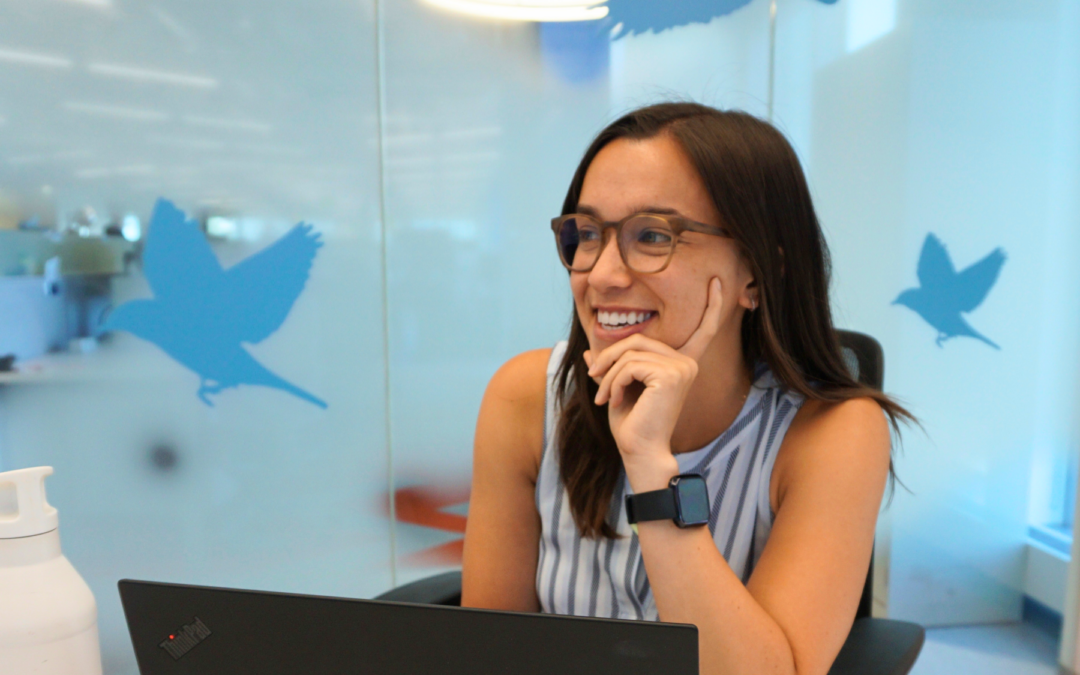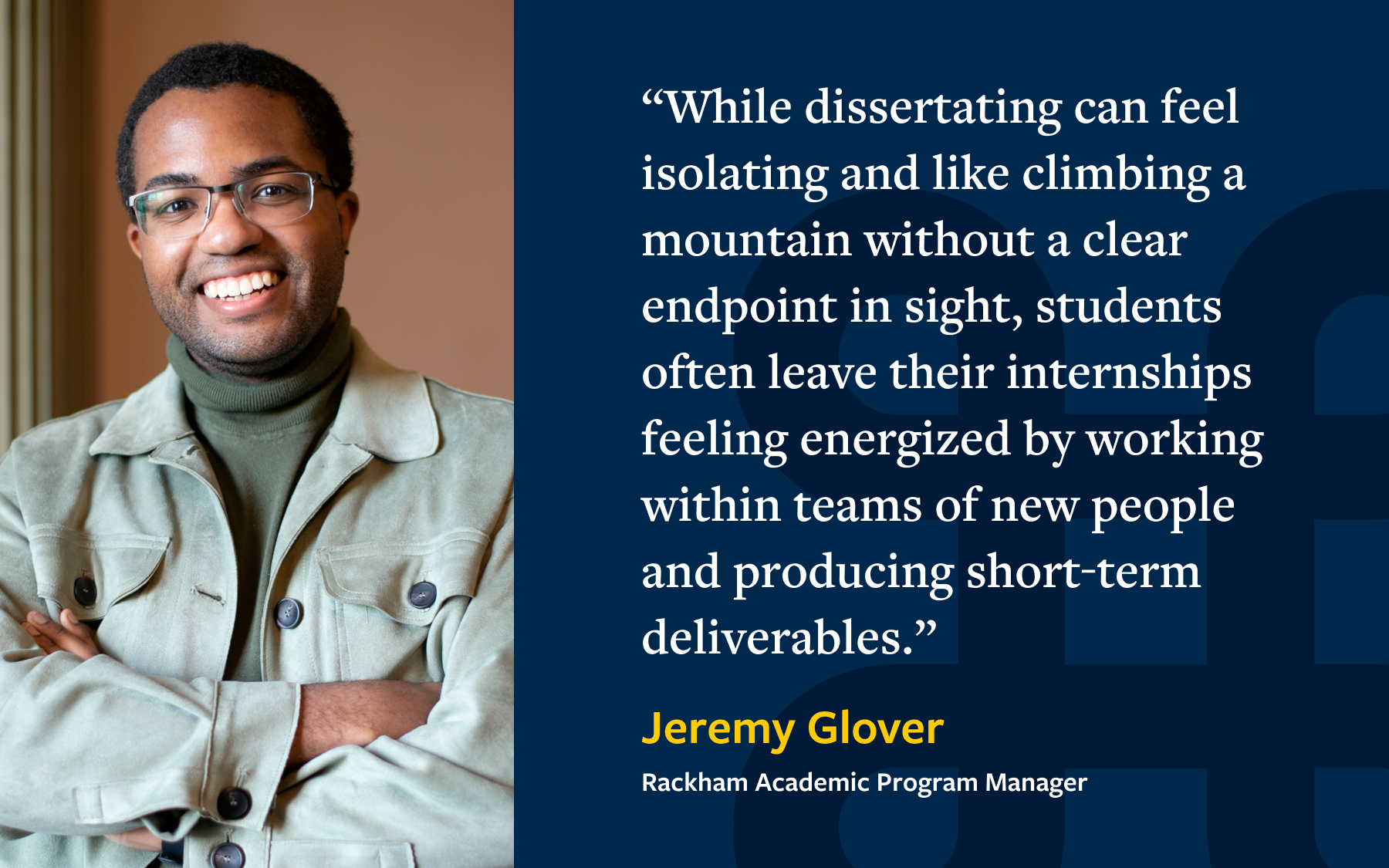Made possible by Rackham and the generous support of our donors, the Rackham Doctoral Intern Fellowship Program (RDIFP) supports doctoral students in their professional development goals by funding meaningful intern fellowship opportunities. Students can participate in internships with one of Rackham’s many host organizations or they may apply for funding to support an internship they have secured on their own. Furthermore, Rackham and the University Career Center have partnered to offer workshops to help graduate students learn more about internship opportunities and prepare their application materials.
In this Q&A, Jeremy Glover, an academic program manager on Rackham’s Professional Development and Engagement team, shares their thoughts on the program’s greatest impacts and tips for what makes a successful application.
Talk to me about why intern fellowships are important for many doctoral students to pursue.
Jeremy Glover: The career trajectories for individuals with Ph.D.s are changing rapidly, with more and more Ph.D. holders going into non-academic industries. Professional development is in many respects more important than ever before for doctoral students to prioritize, but this isn’t a cause for despair. Intern fellowships are one tool that students utilize to proactively respond to these developments, and to great success. Internships provide students with the opportunity to acquire new skills and spend time outside their home departments to expand their networks. The relationships that students build through their intern fellowship experiences often last much longer than the internships themselves. Our goal for the program is to support students who are interested in pursuing internships to be able to do so in a way that’s integrated into the rest of their doctoral training.
As doctoral students map out their degree timelines, what advice do you have regarding the best time to participate in RDIFP?
JG: It can vary a lot by student. Some students benefit from completing intern fellowships early on in their programs, while others prefer to wait until they’re closer to finishing, since that’s when they’re most focused on their next steps professionally. The best advice I can give is for students to reflect on what they hope to get out of completing an internship. With a clear sense of what their priorities and needs are, students are often better equipped at both identifying the best time to do an intern fellowship as well as what they want that experience to look like.
With so many RDIFP opportunities available, what advice would you offer to help doctoral students find the best intern fellowship for them?
JG: Since our program has two “tracks” for students to secure intern fellowship funding, that depends on the student and what they hope to get out of their RDIF experience.
For students who are broadly interested in completing an internship but unsure of what exactly they would want to do, Rackham partners with organizations that have articulated projects to which they’re eager to have doctoral students contribute. Both the organizations and the projects they develop benefit from the skills that students develop through doctoral training, often across programs and disciplines, such as the ability to effectively communicate and assess new information.
For students with more specific goals–such as working at a particular organization or in a particular industry–our “student-identified” track would serve them well. For this track, students independently work to secure internships, whether it be by applying for formal internship programs or reaching out to organizations to gauge their interest in working with a student for a semester, and then apply for supplementary funding from Rackham. Much like with finding the best time to complete an intern fellowship, it’s crucial to reflect on what you’d want to get out of your specific internship experience to find the best option for you.
What advice do you have for doctoral students as they prepare their applications for RDIFP?
JG: First and foremost, we’d strongly recommend having a conversation with your advisor, PI, and other relevant mentors to see what advice they may have as you work on your application and consider different internship options. One of our program requirements is that students’ faculty advisors and departments give approval for students to apply for the program, but we encourage students to think about this dynamic not as a matter of begging for permission but instead as a way to reflect on how their academic work and internship experience relate to each other.
Additionally, the University Career Center offers both one-on-one career coaching for graduate students and workshops on topics such as translating CVs to resumes, writing strong cover letters, and interviewing. And of course, the Rackham internships team is always happy to answer questions from students as they arise.
Once a doctoral student lands an intern fellowship, what are some ways they can make the most of this professional development experience?
JG: Since we all know how fast a term can fly by, going into your intern fellowship with a few clearly defined goals can be very helpful. These goals might range from assessing the culture of an organization or industry to see if it aligns with your needs, to making connections with people that you hope to leverage down the road. Above all, take advantage of the fact that you’ve been afforded the opportunity to dive into a project in a context that’s separate from the rest of your doctoral work. Be sure to ask lots of questions of your new colleagues and build connections while giving your internship work your best effort.
While dissertating can feel isolating and like climbing a mountain without a clear endpoint in sight, students often leave their internships feeling energized by working within teams of new people and producing short-term deliverables. Whether you have clear goals or broad aspirations, bring an open mind to your internship since you don’t know where it might lead or what doors your experience might open in the future.


